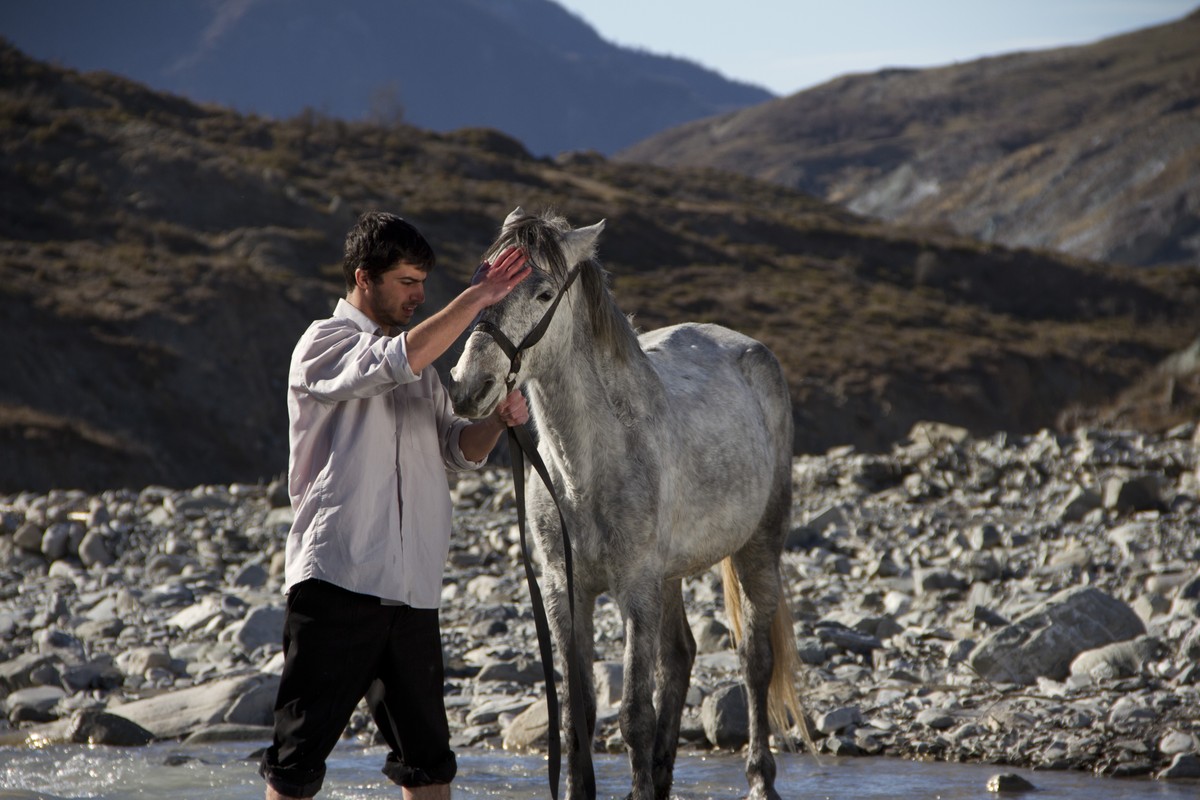Nabat
Nabat and her husband Iskender, an old and sick ex-forestry worker, live in a small isolated house far from the village. War has been raging for some time and their son has been killed at the front. Their sole means of survival is the sale of milk from their only cow that Nabat takes to the village every couple of days.
As the shadow of war envelopes the region the village is slowly deserted by its inhabitants. Following Iskender’s death Nabat has to survive in a now abandoned village under the regard of a she-wolf.
Festivals & awards
Submission to the 87th Academy Awards for Best Foreign Language Film
71st Venice International Film Festival, Orizzonti
50th Chicago International Film Festival, World Cinema
38th São Paulo International Film Festival, Brazil
27th Tokyo International Film Festival
63rd International Filmfestival Mannheim-Heidelberg
45th International Film Festival of India, Goa
14th Marrakesh International Film Festival, Morocco







Credits
Would you like to show this movie?
Please fill out our form.
Feel free to contact us
Press voices
«Ein hochpoetischer Film.» Filmfestival Mannheim
«Eine wunderschön gefilmte, melancholische, ein wenig märchenhafte und manchmal humorvolle Geschichte - ein Meisterwerk.» Tages-Anzeiger
«Elchin Musaoglu schuf einen auch formal berückenden Film, der mehr als einmal den russischen Meister Tarkowski zitiert.» Kulturtipp
«Jedes Bild ist voll Menschlichkeit, ist schön, weil es wahr ist. Ein Meisterwerk!» Seniorweb
«Die Schlusszene bringt Licht ins Ganze und überrascht ebenso wie der Rest des Films.» Film demnächst
«Dokumentarfilmer Elchin Musaoglu hat ein stilles Drama inszeniert um Hoffnung in der Verlorenheit.» Blick
«Eine eindringlich schaurig-schöne Parabel über die Erhaltung von Reststolz in Zeiten des Krieges.» P.S., Thierrry Frochaux
«Nabat ist das Symbol für Frieden und Widerstand. Der Film widerspiegelt die Vergänglichkeit und gleichzeitig die Hoffnung mit hochpoetischer Kraft und Stärke. Beeindruckend sind die ausdrucksstarken Bilder mit intensivem Nahblick und die grandiose Kameraführung.» Reformierte Presse
«Elchin Musaoglu - Meister des Hintergründigen und Symbolischen.» Movie News
«In manchen Momenten erinnert Musaoglu an die poetisch-epischen Filme des Griechen Theo Angelopoulos. Die Stärke des unspektakulären Films liegt in der Stille, in seiner Intensität und Intimität – ein poetisches Bilderwerk, das am Ende vom Schnee zugedeckt wird.» Cineman
«Der grossartig komponierte und erzählte Film wandert von Festival zu Festival und holt sich mit seiner formalen Perfektion und seiner menschlichen Tiefe verdiente Preise. Unter den Filmen, die in der letzten Zeit bei uns angelaufen sind, steht ihm formal wohl «Winter Sleep» von Nuri Bilge Ceylan am nächsten, auch wenn dieser mehr Psychologie und weniger Symbolik enthält als Nabat. Ruhe, Stille, Dichte, Fülle sind seine Eigenschaften. Jedes Bild ist voll Menschlichkeit, ist schön, weil es wahr ist. Mit seiner Langsamkeit und Askese lädt uns Musaoglu zu einem anderen Rhythmus ein, als wir ihn sonst im Kino und im Alltag erleben. Schon nach einer Viertelstunde scheint unser Herz langsamer zu schlagen als üblich. Wir werden eingeladen, Nabat auf ihrem Weg durch die Welt des Krieges zu folgen, in welche sie, wie in der katholischen Osterliturgie, das Licht bringt: «Lumen ad revelationem gentium», das Licht zur Erleuchtung der Völker. Sichtbar gemacht in Bildern von grosser Schönheit, die an Werke des Niederländers Jan Vermeer (Kamera Abdulrahim Besharat) erinnert. Der schweigende Schluss mit der bewegungslosen Nabat, die das Licht gebracht hat, verweist auf den Anfang, die bewegungslose Landschaft, die der Erlösung harrt.» Seniorweb
Director’s Statement:
When the USSR fell apart in 1991 war engulfed my region. I was working as a documentary maker for a TV channel when a colleague told me of a story he was witness to. Fighting had forced the evacuation of the inhabitants of a village. Just an old woman refused to leave as her family members were buried there. I told myself that only a mother could behave thus and decided to make a film about one. In all conflicts it is mothers who suffer the most. It is not for nothing that people say, ‘Paradise is to be found beneath a mother’s feet’. I sincerely believe that if more power were given to mothers the world would be a better place.
En 1991 au décours de la dissolution de L’URSS, la guerre s’est déclenchée dans tous les pays de la région. Mon pays ne fut pas épargné par ce conflit. Je travaillais à l’époque comme documentariste pour une chaine de télévision. Un jour, un de mes camarades m’a raconté une histoire qu’il avait vue de ses propres yeux. Sous les feux d’une guerre meurtrière, les habitants d’un village avaient été contraints de quitter leurs habitations.
Seule une femme âgée avait refusé de quitter son domicile. Elle disait que toute sa famille était enterrés dans le village. Je me suis dit que seule une mère pouvait agir ainsi. J’ai donc décidé de faire un film sur une mère. Dans toutes les guerres, les mères sont celles qui souffrent le plus. Ce n’est pas pour rien qu’on dit que « Le Paradis est sous les pieds des mères ». Je pense sincèrement que si les mères avaient davantage de responsabilités et de pouvoir, le monde retrouverait plus d’espoir.





